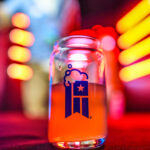Numero 06/2019
4 Febbraio 2019
Dois Corvos take flight
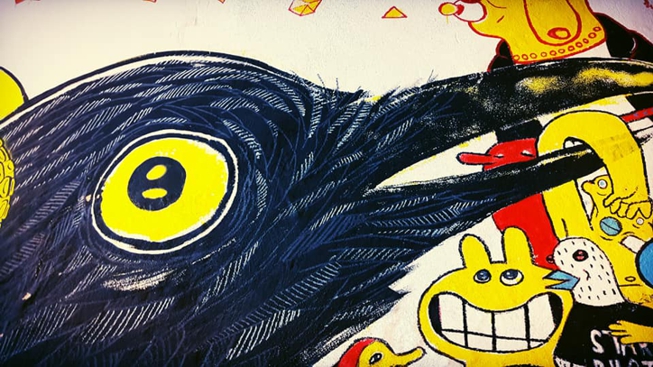
INTERVISTA ORIGINALE IN LINGUA INGLESE – VAI ALLA VERSIONE IN ITALIANO!
Portugal is a country with an important history, but it has also a past with trouble.
A place where the flowers prevailed on rifles.
A mix of humility, civilization and willingness to grow.
When Portuguese people felt themselves a step away from the economic crisis, they did not calculate how deep it was, but how many steps forward had to be made in order not to fall into it.
Today it is one of the most fascinating countries to visit and I think Lisbon is the cherry on the cake.
Maybe even Scott and Susana think like me because they chose to open their brewery in the capital.
Almost all those who become brewers left from the stove of the house, mixing strange concoctions in a pot with the hope of being able to see the birth of a great beer and dream of having found the perfect recipe.
A dream that for some becomes reality, but much more difficult than you think.
You do not need luck, but a lot of work that must be combined with skills, passion, desire to improve and a good dose of stubbornness, dedication and audacity.
Scott and Susana lack nothing of this, they have to sell.
Like the conquistadores of the past, they began their adventure in Portugal.
Now let’s find out their story …
.

.
Scott Steffens and Susana Cascais tell us about your past …
When was the decision to start brewing and what does it mean for you?
[Scott:]
I started drinking beer in the 90’s. I grew up in an area of the United States where binge drinking was common, but I pretty quickly cared about the quality of beer rather than quantity of beer I was drinking. This was in the early days, where brands like Pete’s Wicked Ale, Sierra Nevada, Sam Adams, and some imports like Samuel Smiths were around.
Through the years, I was always close to craft beer, making brewery visits and trying everything I could get my hands on. This wasn’t really common back then, when few cared about craft beer, and you didn’t see the effort to seek out new beers like you do today.
I had always been close to the beer scene in Seattle but never worked in it professionally. Susana fell in love with craft beer when she moved to Seattle in 2002, as it was a big part of the local culture. When Susana and I moved back to Portugal in 2012 we brought our home-brew equipment with us because we knew from all the past visits to Lisbon that the beer scene was non-existent, and good beer is something we would miss living in Lisbon – a city that had no breweries at that time.
We started making beer in early 2013 for ourselves and friends, and by the end of that year, we formed the company and started making plans to find a space and acquire equipment. It wasn’t until 2015 that we brewed our first production batch and opened our tap room.
Why did you call your “Dois Corvos” brewery?
Dois Corvos (“Two Crows”) is a subtle reference to Lisbon, the city we love and have made our home. The Lisbon coat of arms has a caravel (Portuguese ship) with two crows. The legend of the city is that the body of São Vicente was exhumed from the Algarve and brought to Lisbon by ship. Everyone on the ship died but it was guided by two crows.
.

.
In the last two years you have had many awards, but what difficulties did you encounter at the beginning and what was your first satisfaction?
When we set out to start the brewery there were no breweries in Lisbon that we could turn to for advice to see how they navigated certain bureaucratic hurdles. There were many points during construction when we weren’t sure how to get through to the next stage and I questioned whether our investment would be a total loss. It was pretty discouraging how some of the people at various public offices put up barriers in our plans. It’s important to point out that other people we encountered were extremely helpful and went out of their way to see us succeed in our opening of the brewery, but navigating the various public offices was a big challenge. We obviously got through it and persevered. I should also note that we weren’t the first brewery to open in Lisbon – Oitava Colina opened a few months before us but since we didn’t know about each other at the time, we were each flying blind.
Perhaps the highlight for me was our first anniversary party. We were expecting a normal night in the Tap Room but the streets out front were so crowded that cars couldn’t pass. People came up to me and said what we had done had changed their lives. It was an extremely emotional and very proud moment.
.

.
How is the Portuguese craft beer market evolving?
It’s evolving at a fast pace. It’s hard to draw comparisons to the US because there are a lot of differences, both in culture, laws, size of breweries and history. In the US, craft beer lived off of pales ales and ambers for 20 years before anyone thought of making an IPA. Here the history is very compressed – people want to jump to more extreme styles immediately. There’s still a place for lighter, more easy-drinking but interesting styles, but the market is more dynamic much earlier.
On one side Sagres and Super Bock, on the other Dois Corvos, Musa, Oitava Colina, Letra (to name a few) … a complex war?
The other Portuguese craft breweries are our friends – we do events and collaborations with Musa, Letra, Oitava Colina and many more. There are many good people at the big breweries who I consider friends. But Sagres and Super Bock have been at war with each other for so long, they really don’t have any common ground with each other, and, on a sales level at least, have the desire to totally annihilate each other. It’s in “shareholder interest”. Occasionally craft breweries are in the cross-fire, which is unfortunate, because we make up a fraction of 1% of Portuguese beer sales. You can’t have a healthy beer community when you wish destruction on other breweries.
During the decades preceding the availability of craft beer in Portugal, the big breweries were completely focused on making beer cheap and available everywhere. It was thought of as a soft drink for adults. You can even find recent quotes of beer executives framing it this way. Craft beer has brought value back to beer; it’s no longer a commodity.
.
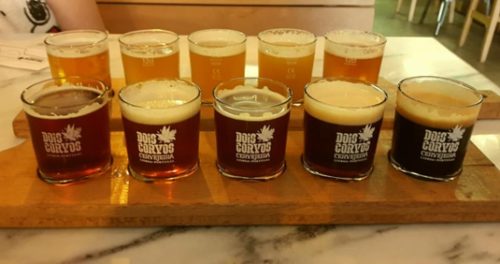
.
The craft world in Portugal is growing.
Have there been any attempts at acquisitions by large companies?
There have been some minor acquisitions, but not by big beer companies. It’s very early and the craft breweries are very small at this point. We’ll see how that shakes out in the coming years.
Can you give us the identikit of the Portuguese beer consumer?
Like anything product, there’s a continuum depending on the level of passion. There are the beer enthusiasts who show up at all the events and in all the tap rooms, and want to try everything. This was me before I entered professionally. Then there are people who may not go out of their way to find craft beer but may try it when it’s available at the store or restaurant.
Portuguese people are very much into gastronomy. One thing I’ve observed is that the first time a person tries craft beer, it’s not uncommon for them to immediately talk about what food the beer might go well with. This is light years ahead of beer culture in the US, where most people think of beer as something separate from food.
.

.
The cousin of beer is and will always be the wine.
In Portugal there is an important tradition to which is added also that of the Port.
But this world can stimulate experimentation and I recently tasted one of your beer in red wine barrels … a new road that you have undertaken?
I’ve always had a passion for barrel aged beer, and we first put beer into barrel a few months after starting production. In this case it was a Portuguese aguardente (brandy) barrel. We have about 150 barrels in our collection – often we put a “clean” beer in first – an imperial stout, saison, barley wine or another big beer. The second use we will often switch to a mixed fermentation (wild/sour) fermentation, which can then later involve a fruit or other addition.
These barrels “blessed” how much value do they have?
We source barrels mainly from Portugal. Former red wine, white wine, brandy, Port, moscatel, Abafado (the last two are fortified wines similar to Port but more nutty and candy-like), bourbon, Scotch whiskey, Arinto (a mineral white wine). Today we’re packaging a mixed fermentation saison that was in some “late harvest” barrels – barrels that contained wine with botrytis or “noble rot”. It’s fantastic.
.

.
That beer I had the opportunity to drink it in Italy at Acido Acida Festival thanks to the forward-looking Davide Franchini and Kosmo a beershop of Perugia … export your beers in which countries, but especially in which you are more successful?
Which problems did you find?
Yes, we love Gigi from Kosmo and the Italian bars where we’ve had the opportunity to place our beer. France and Italy are our biggest markets, Spain and the Netherlands are growing markets and we occasionally send beer elsewhere. We’ve had a shortage with supply in the past – I prefer to keep as much beer in Portugal as possible, and we often run out in the summer, so that has hampered our exports some. We’re building a new brewery [see below] and adding more tanks and capacity so that will free us up to turn to exports a bit more in the future.
Let’s go back to the Craft Beer … the selection of products is important, what is your philosophy about it?
I was always one who liked to try everything, so our brewery is a reflection of that. We have a few year-round beers that we make but we have many beers that we make seasonally, off-and-on, or one time only. With that said, we try and satisfy restaurants, who usually want more consistent easier-drinking beers as well as craft beer bars who are fine with more challenging and experimental styles.
We’re a brewer-led company, so my team and I get to decide what beers we make, what ingredients we choose and we have a lot of freedom with recipes design. You don’t find too many breweries at our small size who have made such an investment in oak barrels, for example. We’re still figuring out if that will pay off!
.

.
Mastrobirraio profession, what does it mean for you to make a beer?
The feedback loop in brewing is long – from the time you brew a beer until the time you package it is typically 3-4 weeks, which is a long time when you’re trying to make small changes to perfect a recipe. As opposed to cooking where you can make the same dish many times in a day.
There’s the creative side, but also the technical side. The creative side is more romantic but the technical side is what’s often unknown to those who are just starting. For me, it’s managing our QC & lab, brew house & cellar, making sure we’re brewing the right beers at the right time for supply purposes, running the right tests, managing the production staff and putting the right people in the right place at the right time, and of course managing the budget, because running a brewery is the opposite of a get-rich-quick scheme – money is tight and you have to make investments wisely. Fortunately we have an excellent team that can handle the demands that we put on them.
What are the positive and negative aspects of your job?
I love our team, and try to make sure everyone can shine. While I like staying in the background to some degree, I do like making whatever impact we can on the local beer community and I’m proud of what we’ve accomplished so far. The worst part of the job is the stress – wondering how a beer is progressing, or when essential equipment breaks, if we’ve made the right choice of investments in the brewery, etc. But in the end, I can’t imagine doing anything else.
A question that I have not done for a long time … what does the word Beer mean to you?
Beer is ultimately a social beverage – it brings together friends and allows new friendships to spawn. So if you mention “beer”, the mental image that comes to mind is sitting around a table with friends in a bar, could be talking about beer, or more than likely, talking about something else but enjoying the beer in our hands.
The favorite beer of your production?
We’ve made a couple of barrel aged beers that stand out in my mind. We made a barleywine in Abafado barrels called Babilónia, which was a collaboration with friends, but the combination of the rich and mildly sweet barleywine with this candy-like flavor from the Abafado in the barrel was incredible. We have a beer in some special barrels that we’ll release for our fourth anniversary, so I won’t talk too much about that yet.
.

.
Portugal is a land with interesting gastronomic products.
Choose a specific one and pair your beer.
Sardines and Três Santos, a session beer we make in early June for the Lisbon Popular Saints festivals.
How much and what is being done in Portugal to spread the beer culture?
There are some wonderful organizers here that put on great beer festivals. And some great people who have started craft beer bars that showcase what’s being made here and as venues for gatherings. There’s obviously no money for advertising in craft beer, so it’s all spread via word of mouth and social media, the same as everywhere. But considering there’s no money for advertising, craft beer is something that the customers demand, which is the only reason it’s growing at such a fast pace.
The labels of your beers do not go unnoticed … do you want to tell them?
We’ve had good luck finding designers and illustrators to work with locally. We can be a bit micro-managing about our label design, but that hasn’t turned off too many designers yet.
.
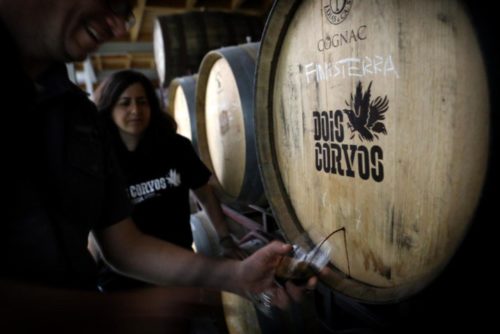
.
Who is the CR7 of the brewery world?
That might not be the best analogy, because brewers don’t usually go around proclaiming that they’re the GOAT (Greatest Of All Time) – there’s more humbleness and in the craft beer community, it’s less about conquering the opposition.
Is there a country or place that you could call “Nirvana della Birra”?
I still love trips back to Seattle and the Pacific Northwest. Of course it’s familiar to me, but craft beer is ubiquitous and it’s so good. And I feel the PNW is getting beyond just being a showcase of Yakima hops – there are fantastic sours and the same kind of experiments you see happening everywhere else – but it does happen to sit next to the world’s premier hop-growing region.
Future projects?
Tons! We’re currently finishing up construction on our new space, about 2 km from our existing brewery and Tap Room. We will move the majority of the production there and it won’t have a regular public space but we will host special events. The Tap Room will remain our premier public space, and we’ll keep producing sours and other small batch projects in that original space. With a little more kitchen area available, we hope to increase our food menu as well.
.
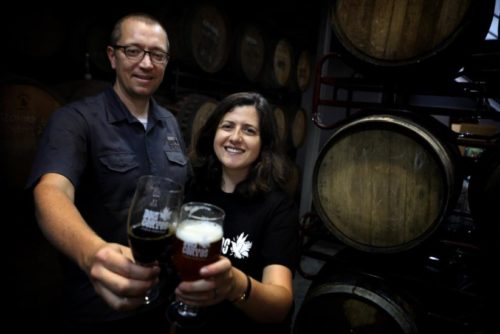
.
I think that at this moment the Portuguese brewery movement is experiencing a “Revolução de Cerveja” and I hope that Vasco da Gama will show him the way to go.
I like to conclude with a slogan almost as a travel agency:
“If you love pristine beaches, art, good wine, and you do not mind having the wind in your face, it’s time to visit Portugal. But remember that you can also taste excellent craft beer thanks to people like Scott and Susana. ”
What distinguishes people one each other is the strength to realize something, or to let fate be done to us.
(Fernando Pessoa – The book of unrest)
Boa Sorte Dois Corvos
INTERVISTA ORIGINALE IN LINGUA INGLESE – VAI ALLA VERSIONE IN ITALIANO!






![America craft beer goes for gold - and gets it - at international beer competitions Brussels Beer Challenge 2023 © Bart Van der Perre – highres-1873[180812]](https://www.giornaledellabirra.it/wp-content/uploads/2023/12/Brussels-Beer-Challenge-2023-©-Bart-Van-der-Perre-highres-1873180812-150x150.jpg)


